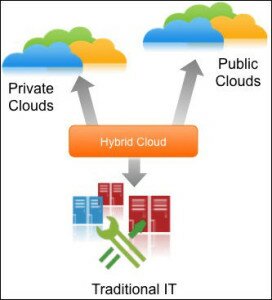Cloud computing may be a new technology, but companies have embraced it to streamline their operations. It is due to this uptake that cloud computing providers are also working on this technology to come up its variations that are tailored to meet their customers’ needs. One such variant is the hybrid cloud.
So what exactly is a hybrid cloud? To satisfactorily answer this question, you need to understand what cloud computing is. Cloud computing means providing computing services over a network called a cloud which is typically the internet. In delivering these services, there are different types of clouds that can be used with the main ones being public and private. A hybrid cloud is a computing technology that utilizes both private and public cloud to offer services to an organization. This technology was established to address the fact that companies have found it necessary to have both the public and private clouds and thus eliminates the need to go for the two since the hybrid cloud is an integration of the two.
How is the Hybrid Cloud Useful?
Although organizations need the public cloud to establish a decentralized working environment, the private cloud ensures that internal IT services are only available within the organization’s network. Things like data center services are best shared via a private cloud. Therefore, an organization can benefit from this hybrid cloud by deploying non-sensitive operations via the public cloud and information that needs to be properly secured via the private cloud. This means that the hybrid cloud can be very effective in increasing cost efficiency and scalability within an organization.
Hybrid Cloud Deployment
The way the hybrid cloud is deployed is determined by the organizations needs and preferences although cloud service providers also have a say in it. This notwithstanding, there are three main deployment methods.
l Different cloud service providers can team up to avail both private and public cloud services integrated into one. In this case, the organization receives different cloud services from different providers but these providers work together in integrating the two services.
l A single cloud service provider can also offer a completely hybrid package to organizations. This may not be the common deployment option yet, but it is the best way to do this since the organization has only one party to deal with.
l There are organizations that already have their own private cloud services. Such organizations can sign up for the public cloud and integrate it with their existing private cloud to form the hybrid cloud.
Features of the Hybrid Cloud
A hybrid cloud configuration can offer organizations the following features.
Scalability
A private cloud may be scalable, but the hybrid cloud takes this scalability to a whole new level. It makes it possible for organizations to share their non-sensitive information over a large cloud infrastructure that has even fewer boundaries. An organization can benefit from the public access of the public cloud which also helps in decongesting the private cloud.
Cost Efficiency
Public clouds are known to offer cost effective options for sharing information and services than private ones. Therefore, a hybrid cloud search tool enables organizations to access these cost savings while still keeping vital information safely on the private cloud.
Security
An organization that deploys the hybrid cloud can be assured of security of sensitive operations or even data since this data is only available on a private cloud. As such, hybrid clouds can provide better security than public clouds on their own.
Implementing a hybrid cloud for your organization is the best decision if you want to ensure that your employees can work off-site but still keep your data safe.
Contact us if you have any questions.

